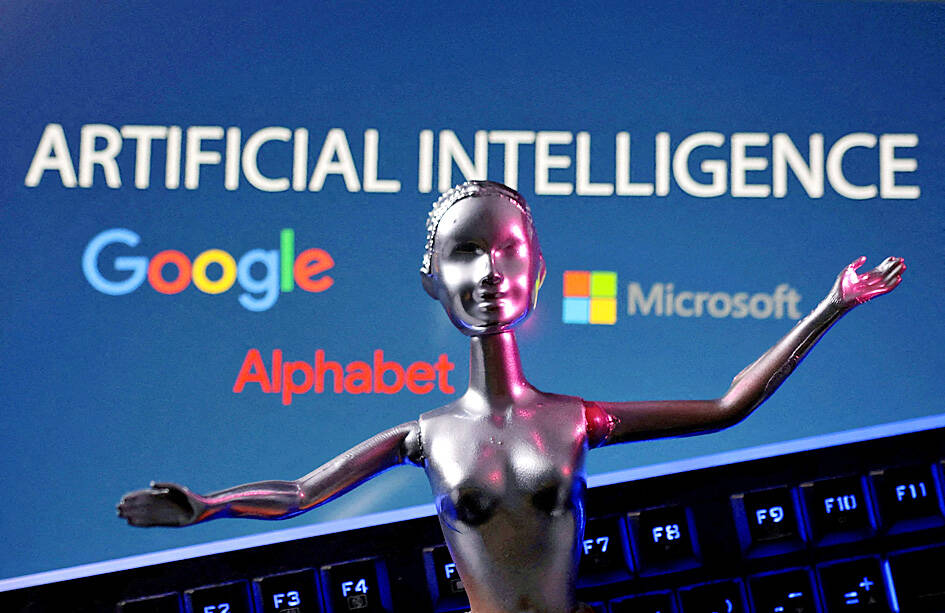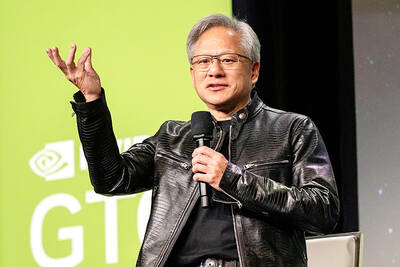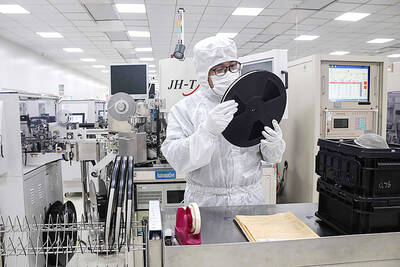Google is adding two new features to its image search to reduce the spread of misinformation, especially now that artificial intelligence (AI) tools have made the creation of photorealistic fakes trivial.
The Alphabet Inc company’s first new feature is called “About this image,” serving up additional context like when an image or similar ones were first indexed by Google, where they first appeared and where else they have shown up online.
The intent is to help users pinpoint the original source, while also contextualizing an image with any debunking evidence that might have been provided by news organizations.

Photo: Reuters
Google is to mark every AI-generated image created by its tools as such, and it is working with other platforms and services to make sure they add the same markup to the files they put out.
Midjourney Inc and Shutterstock Inc are among the publishers Google has on board, and the goal is to ensure that all AI content that appears in search results is flagged as such.
The provenance of images online is a growing issue in the AI age, and there are several start-ups working to produce verification and authentication tools.
Microsoft Corp-backed Truepic Inc offers systems that ensure an image has not been manipulated from capture to delivery.
Google’s new features, which are rolling out over the course of this year, are comparatively lower-tech, though they might have a bigger positive impact with sufficient industry support.

It was late morning and steam was rising from water tanks atop the colorful, but opaque-windowed, “soapland” sex parlors in a historic Tokyo red-light district. Walking through the narrow streets, camera in hand, was Beniko — a former sex worker who is trying to capture the spirit of the area once known as Yoshiwara through photography. “People often talk about this neighborhood having a ‘bad history,’” said Beniko, who goes by her nickname. “But the truth is that through the years people have lived here, made a life here, sometimes struggled to survive. I want to share that reality.” In its mid-17th to

‘MAKE OR BREAK’: Nvidia shares remain down more than 9 percent, but investors are hoping CEO Jensen Huang’s speech can stave off fears that the sales boom is peaking Shares in Nvidia Corp’s Taiwanese suppliers mostly closed higher yesterday on hopes that the US artificial intelligence (AI) chip designer would showcase next-generation technologies at its annual AI conference slated to open later in the day. The GPU Technology Conference (GTC) in California is to feature developers, engineers, researchers, inventors and information technology professionals, and would focus on AI, computer graphics, data science, machine learning and autonomous machines. The event comes at a make-or-break moment for the firm, as it heads into the next few quarters, with Nvidia CEO Jensen Huang’s (黃仁勳) keynote speech today seen as having the ability to

The battle for artificial intelligence supremacy hinges on microchips, but the semiconductor sector that produces them has a dirty secret: It is a major source of chemicals linked to cancer and other health problems. Global chip sales surged more than 19 percent to about US$628 billion last year, according to the Semiconductor Industry Association, which forecasts double-digit growth again this year. That is adding urgency to reducing the effects of “forever chemicals” — which are also used to make firefighting foam, nonstick pans, raincoats and other everyday items — as are regulators in the US and Europe who are beginning to

NEXT GENERATION: The company also showcased automated machines, including a nursing robot called Nurabot, which is to enter service at a Taichung hospital this year Hon Hai Precision Industry Co (鴻海精密) expects server revenue to exceed its iPhone revenue within two years, with the possibility of achieving this goal as early as this year, chairman Young Liu (劉揚偉) said on Tuesday at Nvidia Corp’s annual technology conference in San Jose, California. AI would be the primary focus this year for the company, also known as Foxconn Technology Group (富士康科技集團), as rapidly advancing AI applications are driving up demand for AI servers, Liu said. The production and shipment of Nvidia’s GB200 chips and the anticipated launch of GB300 chips in the second half of the year would propel